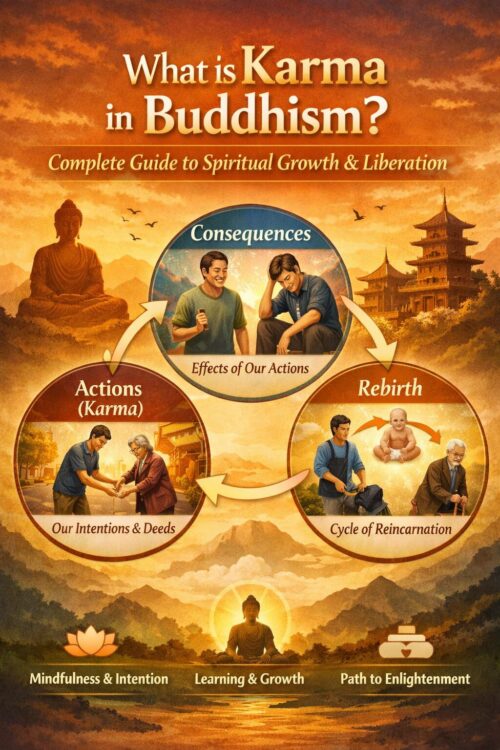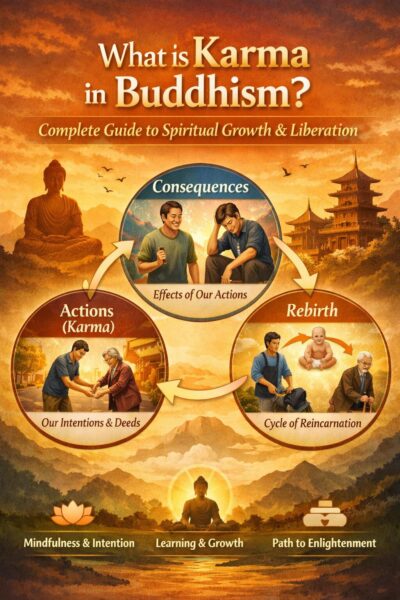Karma: Your Ultimate Guide to Navigating the Law of Cause and Effect, Spiritual Evolution, and Personal Destiny
Introduction: Have you ever used the phrase, “That’s just my karma,” to explain a good or bad event in your life? While the concept has become a popular part of Western culture, its true meaning is far more profound and complex than simple luck or misfortune. Rooted in ancient Indian philosophies, particularly Hinduism and Buddhism, karma is a fundamental universal law of cause and effect. It’s the principle that every action, thought, and word we put out into the world creates a corresponding reaction that will eventually return to us. Karma is not a form of divine punishment or reward but a powerful and impartial system that shapes our destiny, influences our spiritual growth, and teaches us essential lessons across lifetimes. This comprehensive guide will demystify the core tenets of karma, explore its deep connection to personal responsibility and spiritual liberation, and provide actionable steps to cultivate a positive karmic footprint for a life of purpose and peace.
The Law of Action: How Your Karma Shapes Your Reality
At its core, karma is a dynamic and ever-present force. It’s the engine of our existence, fueled by the choices we make. Understanding how this law operates is the first step toward living a more conscious and fulfilling life.
- Every Action Creates a Consequence: The law of karma is built on the simple but powerful idea that every action has an equal and opposite reaction. In Buddhism, this is a core principle. Positive actions, driven by kindness, compassion, and generosity, generate positive karmic energy, leading to happiness and peace. Conversely, negative actions, rooted in greed, anger, and ignorance, create negative karma, which results in suffering and unhappiness. This is not about a vengeful deity keeping a scorecard but about a natural, self-regulating system of the universe. The energy you emit is the energy you receive.
- Transcending a Single Lifetime: One of the most unique aspects of karma is its timeless nature. It’s not confined to our current life but extends across our past lives and into our future lives. The circumstances of your current existence—your family, your health, your challenges—are believed to be the result of the karmic energy you accumulated in past lives. Similarly, the actions you take in this life are shaping the conditions of your future lives. This continuous cycle of known as samsara, is driven by the accumulation of karma. This perspective offers a profound sense of responsibility and purpose, as it highlights that you are not a passive victim of fate but an active co-creator of your destiny.
- The Three Types of Karma: To make this complex process more digestible, ancient wisdom traditions categorize karma into three types, each offering a unique lens for self-understanding:
- Sanchita Karma (Accumulated Karma): This is the vast reservoir of all your actions from every past life. It’s the complete cosmic record of your deeds, waiting to be expressed.
- Prarabdha Karma (Actualized Karma): This is the portion of your Sanchita Karma that is currently active and manifesting in your present life. It dictates your circumstances, your personality, and the challenges you face. This is the karma you cannot avoid in this life.
- Agami Karma (Future Karma): This is the karma you are creating through your present actions, thoughts, and words. It’s the only karma you have complete control over. It’s a powerful reminder that every choice you make today is a seed for your future.
Karma and Spiritual Liberation: The Path to Enlightenment
While karma can seem like an endless cycle of cause and effect, the ultimate goal in many Eastern philosophies is to transcend karma altogether. This state of liberation, known as nirvana in Buddhism, is the ultimate goal of spiritual practice.
- The Journey of Karma Release: The path to liberation is a journey of purification and self-awareness. It involves letting go of the attachments and desires that create new karma. Through dedicated spiritual practices like meditation, mindfulness, and yoga, you can begin to process and release the negative karmic patterns that have been holding you back. This is not about escaping responsibility but about fulfilling your karmic lessons with grace and wisdom. By facing your karma head-on, you can heal past wounds, release old emotional baggage, and break free from the cycle of suffering.
- The Power of Conscious Living: The key to releasing karma lies in conscious living. Every moment is an opportunity to make a choice that either binds you to the cycle or liberates you from it. By living with a high degree of self-awareness, you can observe your thoughts and actions before they become karmic seeds. This practice allows you to respond to situations with compassion and wisdom rather than reacting out of habit and emotion. This conscious choice is the most powerful tool for shaping your destiny.
- Cultivating Positive Karma: While the ultimate goal is liberation, the immediate and most practical step is to cultivate positive karma. This is done through acts of compassion, generosity, and kindness. When you act from a place of love, you not only bring joy to others but also create a positive ripple effect that elevates your own spiritual energy. The law of karma ensures that this positive energy will return to you, bringing happiness and peace. This is the essence of good karma: it’s a virtuous cycle of giving and receiving.
Karma’s Influence on Your Life: Relationships, Career, and Well-being
The law of karma is not an abstract concept; it’s a living force that influences every aspect of your life. By understanding its role in your relationships, career, and overall well-being, you can live with greater intention and purpose.
- Karma and Your Relationships: The people you attract into your life—your family, friends, and romantic partners—are not random. They are part of your karmic journey. The positive and negative interactions you have with others are a reflection of your past karma, and they are also an opportunity to create new, positive karma. By practicing forgiveness, empathy, and unconditional love, you can heal old karmic ties and create a foundation for healthy and fulfilling relationships.
- Karma and Your Career: Your career path and financial success are also influenced by karma. Your diligence, honesty, and hard work are positive karmic actions that will lead to success and abundance. However, if you act with greed or dishonesty, you will create negative karma that can lead to failure and stress. The law of karma encourages you to pursue your career with integrity, a strong work ethic, and a genuine desire to serve others.
- Karma and Your Health: Your physical and mental well-being are a direct reflection of your karmic state. A balanced diet, regular exercise, and a healthy lifestyle are positive karmic actions that lead to good health. Conversely, actions that harm your body will create negative karmic consequences. Furthermore, the thoughts you think and the emotions you hold can also impact your health. By cultivating a positive mindset and releasing negative emotions, you can purify your karma and create a healthier body and mind.
Conclusion: Embracing Karma as a Tool for Empowerment

The law of karma is far from a simplistic system of reward and punishment. It is a profound and empowering philosophy that teaches us that we are the masters of our own destiny. By living with awareness, responsibility, and compassion, we can actively shape our future and create a life filled with purpose and peace. The journey of karma is a constant cycle of learning and growth, urging us to become better versions of ourselves. By understanding the timeless nature of karma, embracing conscious living, and cultivating positive actions, you can transcend suffering, achieve spiritual enlightenment, and live a life that is in perfect harmony with the universe.
